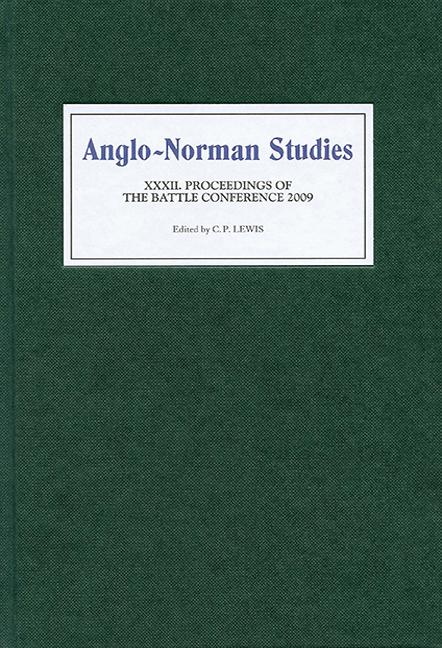Book contents
- Frontmatter
- Contents
- List of Maps and Tables
- Editor's Preface
- Abbreviations
- The Peace of God and Bishops at War in the Gallic Lands from the Late Tenth to the Early Twelfth Century
- Ad erudiendum tradidit: The Upbringing of Angevin Comital Children
- Coming and Going: The Use of Outdoor Space in Norman and Anglo-Norman Chronicles
- The Urban Transformation in England, 900–1100
- The Taming of the Laity: Writing Waltheof and Rebellion in the Twelfth Century
- Close Relations? Some Examples of Trade Links between England and the Towns and Ports of Lower Normandy in the Thirteenth and Early Fourteenth Centuries
- The Roots of the English Royal Forest
- Knighthood and Chivalry in the Histories of the Norman Dukes: Dudo and Benoît
- Prayers for the King and Royal Titles in Anglo-Norman Charters
- Domesday Mortlake
- Miscellaneous Endmatter
Prayers for the King and Royal Titles in Anglo-Norman Charters
Published online by Cambridge University Press: 28 April 2017
- Frontmatter
- Contents
- List of Maps and Tables
- Editor's Preface
- Abbreviations
- The Peace of God and Bishops at War in the Gallic Lands from the Late Tenth to the Early Twelfth Century
- Ad erudiendum tradidit: The Upbringing of Angevin Comital Children
- Coming and Going: The Use of Outdoor Space in Norman and Anglo-Norman Chronicles
- The Urban Transformation in England, 900–1100
- The Taming of the Laity: Writing Waltheof and Rebellion in the Twelfth Century
- Close Relations? Some Examples of Trade Links between England and the Towns and Ports of Lower Normandy in the Thirteenth and Early Fourteenth Centuries
- The Roots of the English Royal Forest
- Knighthood and Chivalry in the Histories of the Norman Dukes: Dudo and Benoît
- Prayers for the King and Royal Titles in Anglo-Norman Charters
- Domesday Mortlake
- Miscellaneous Endmatter
Summary
Anglo-Norman charters have sometimes seemed less forthcoming than those of other dynasties about contemporary kingship. Some historians, perhaps influenced by developing diplomatic conventions, have characterized the Anglo-Norman kings as more pragmatic and prosaic than others. For example, the royal intitulatio, almost invariably Rex Anglorum, has often been contrasted with imperialistic Anglo-Saxon royal titles to argue that the Anglo-Norman kings were less interested in the ideology of overlordship and empire than either their predecessors or contemporary writers.It is such writers who have been most used by historians of Anglo-Norman kingship, but their works come with their own problems and their representativeness is difficult to determine. Recent work has, however, reaffirmed that royal charter diplomatic could be carefully considered, and that, as Professor Dauvit Broun has written, ‘routine features and small variations in established forms, may reflect the ideas rather than the day to day realities of government’. What follows evaluates the occurrence in royal charters of pro anima clauses (first considered by Emma Mason in 1982), named predecessors, and unusual titles and diplomatic forms within this methodological context, broadening the analysis to contemporary forgeries and episcopal and baronial charters. A comparative approach to the representation of the king across these groups of documents, which are usually considered independently, can be informative.
Caution is necessary nevertheless because not all diplomatic developments are significant. Even royal scribes could make mistakes, while early references to William I as magnus may signify only ‘the elder’, not ‘the great’. Scottish royal charters ceased to include multiple ethnic groups in their address clauses c. 1179, but not because there was now an identifiable Scottish people. Rather, royal clerks were imitating changing English practice. Robert of Gloucester's title of consul in his charters, rather than comes, has been described as literary affectation. Representation of authority could, nevertheless, be carefully considered. Robert was consul consistently in his charters, and never the dux which William of Malmesbury and Geoffrey of Monmouth made him. Theirs, not his, was the literary affectation. Canterbury's disputed primacy is found in all but one episcopal profession from Henry I's reign, but in only two archiepiscopal charter superscriptions before the mid-1140s. Caution was exercised at the profession because a papal legate was present, but reference to the primacy may have been thought to undermine the authority of a charter.
- Type
- Chapter
- Information
- Anglo-Norman Studies XXXIIProceedings of the Battle Conference 2009, pp. 184 - 202Publisher: Boydell & BrewerPrint publication year: 2010



